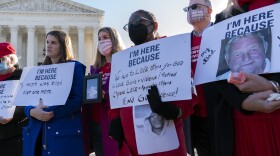Federal agents who forgot that a detained San Diego college student was in a jail cell and left him without food or water for more than four days were reprimanded and suspended for up to seven days, a punishment the Justice Department says is inadequate.
The case involves Daniel Chong's detention in 2012 by agents from the Drug Enforcement Administration.
"What happened to Mr. Chong is unacceptable," the Justice Department said in a letter released Tuesday to Sen. Chuck Grassley, R-Iowa, who heads the Senate Judiciary Committee.
The letter said "the DEA's failure to impose significant discipline on these employees further demonstrates the need for a systemic review of DEA's disciplinary process." The DEA completed its disciplinary review in March.
The Los Angeles Times reports on the background to the story:
"Daniel Chong was swept up in a 2012 DEA raid on his friends' house, where he had gone to smoke marijuana. After an interrogation, he was told he would be released.
"But the agents responsible forgot about him, according to a Department of Justice Office of Inspector General report last summer, leaving him to drink his own urine to stave off dehydration. ...
"Chong, who was never charged with a crime, was kept in total isolation with his hands handcuffed behind his back in a windowless cell with no bathroom, calling out periodically for help. Midway through the ordeal someone turned off the light in his cell, leaving him in darkness.
"When he was finally discovered he was delirious, with serious respiratory and breathing problems. He was hospitalized for four days, and he and his lawyers said at a news conference last summer that he underwent intensive therapy for post-traumatic stress disorder."
Chong later reached a $4.1 million settlement with the government.
"I didn't stay sane," he told All Things Considered's Audie Cornish in May 2012, weeks after his arrest. "Eventually, by the second or third night ... I went completely insane and was just trying to get a grip on reality, on what's happening to me."
Copyright 2021 NPR. To see more, visit https://www.npr.org. 9(MDAxNzg0MDExMDEyMTYyMjc1MDE3NGVmMw004))



